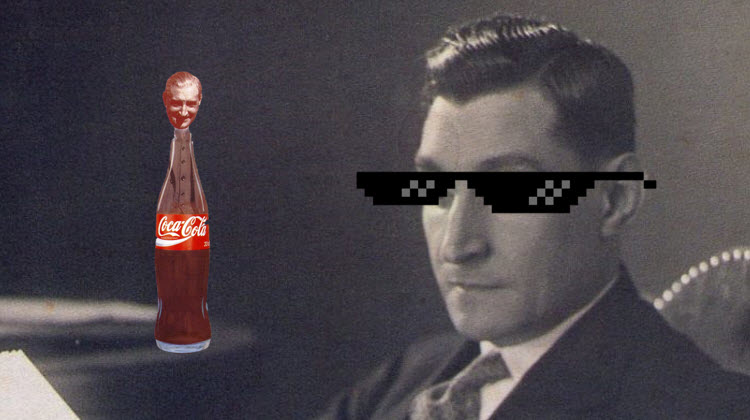
Despite the beverage being almost as half as old as the country it originated from, America, Coca-cola has a much more tumultuous history in it’s front Atlantic neighbour, Portugal.
A symbol of American market capitalism, Coca-cola was created in the late 19th century, actually as a medicinal drink, from coca leaves and kola nuts (a source of caffeine). As usual, everything that is born in America eventually spreads out to Europe and this case was no exception, the only delay being made by time travels and communication technologies at the time.
Coca-cola tried to implement itself in Portugal in the 1920s. The representative of Coca-cola in the country, friend of the famous, half-insane poet, Fernando Pessoa, even recurred to him to make their first slogan to make the beverage more widely accepted in the country. “Primeiro estranha-se, depois entranha-se.” was the most famous and indeed iconic quote that would come out of it, roughly translated to first “You estrange it at first but then it entrenches you,” couldn’t be truer, despite the drink not being anything special or delicious, it was indeed addictive, like a drug.
This slogan, despite catchy for the Portuguese language, it would also be death sentence of the company in Portugal.
“Fernando Pessoa’s slogan helped the death of Coca-Cola’s representation by my father”, reads the text by Moitinho de Almeida (son of the representative of Coca-Cola in Portugal at that time). “The well-known scientist [Ricardo Jorge, director of Health in Lisbon]” had the product on the market seized and thrown it into the sea”,” reads Mega Ferreira, from another book of his in which he recovers the same story.
The problem with the chosen slogan, said the doctor, was to express “the toxicity of the product, since “you estrange it at first but then it entrenches you”, which is “precisely what happens to narcotics”. And “if the product includes coca, from which a narcotic is extracted, cocaine, the merchandise could not be sold to the public, so as not to intoxicate anyone,” wrote Moitinho de Almeida, explaining the position of the hygienist doctor friend of Oliveira Salazar, based on Pessoa’s own reports. “But if the product doesn’t have coca, then advertising it with that name to sell it would be scam, which also justified it not being allowed on the market.”
The reason to ban Coca-cola would be, besides a medical one, political as well.
Salazar, in his stance against comfort and liberalism, had always thought that a country that had the courage to be poor would be an invincible country. In 1962, almost 30 years after he took charge of the country, this was still how he saw Portugal: a modest, humble, obedient country. But the world did not go in that direction. Ever since the end of WWII, liberalism has taken over the Western World and appetites for aberrant consumption were beginning to be detected.
The history of his relations with Coca-Cola is exemplary. It was not only because the drink hurt the interests of viticulture that Salazar decided to ban it. Beer also did it and ended up settling in Portugal. It is said that one day an American official tried to bribe him, convinced that in this way the objective would be achieved. There is only documented what Salazar wrote to A. Makinsky, the head of the multinational in Europe.
Salazar clearly explained the reasons for the refusal:
“I know perfectly well that you have nothing to do with wines, nor with fruit juices and it is for another reason that – despite the excellent relations that we maintain, you and I, and that they date from the time when you represented the Rockefeller Foundation and did not even dream of being part of Coca-Cola – I was always opposed to it’s appearance in the Portuguese market. This is what I could call our moral landscape. Portugal is a conservative, paternalistic country and – God be praised – backward, a term that I consider more flattering than pejorative. You risk introducing into Portugal what I detest above all else, that is, modernism and the famous efficiency. I shudder at the thought of your trucks travelling, at full speed, the old streets of our ancient cities, accelerating, as they pass, the pace of our secular habits.”
As long as Salazar lived, the symbol of modern civilization would not cross Portuguese borders. He wanted it this way and so it was done. The beverage was banned in the Portuguese Metropole, but on it’s colonies it was a different tale, far away from mainland Portugal, Angola and Mozambique were able to consume the ‘murky water of capitalism’, unlike it’s European counterpart, as these regions were also more prone to experimentation, not only in architecture but all sorts of liberal and bourgeois culture as well as an alliance between a South African subsidiary of the company and a Cuca beer producer.
The beverage would have stayed banned in Portugal until 1977. Until this very day, capitalist, liberal and centre-left newspapers label this ban as nonsense. They banned Coca-Cola for 60 years? Insane – as so they say. You can criticize Coca-Cola for whatever you like, it’s bad for your health, it tastes bad, it’s not a national or European brand, but in the end, you can’t really deny that wherever this company goes, liberalism follows suit, and the country it entrenches in, slowly, but surely becomes more Americanized as time goes by.
Please wait…
RELATED ARTICLES
Did you like this information? Then please consider making a donation or subscribing to our Newsletter. Source
 RSS Feed
RSS Feed















 March 12th, 2021
March 12th, 2021  Awake Goy
Awake Goy 
 Posted in
Posted in  Tags:
Tags: 













